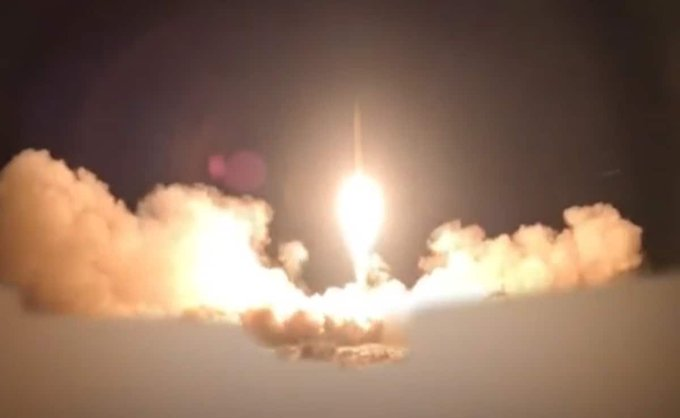
In a move that has sent shockwaves through international diplomatic circles, Iran claims it struck the Al-Udeid base of the United States in Qatar’s capital city, Doha, releasing a dramatic video of what it alleges is a direct missile attack in retaliation for recent American airstrikes on Iranian nuclear sites. The released footage shows a missile being launched from an Iranian site and eventually hitting what is believed to be a target in Qatar.
While the veracity of the video is yet to be independently verified, the claim has heightened tensions in the already volatile Gulf region. This marks a significant escalation in hostilities between Iran and the United States, bringing the conflict closer to a wider regional confrontation.
Tehran Releases Video of Missile Strike
Iran reportedly shared a video capturing the missile launch from its territory, aimed at the Al-Udeid air base—the largest US military installation in the Middle East, located southwest of Doha. The video, according to Iranian state sources, shows the projectile’s launch and its eventual impact, though the precise coordinates and damage levels remain undisclosed.
The missile type used in this retaliatory strike has not been officially revealed, sparking speculation among defense analysts. Iran has codenamed this operation “Besharat Fatah”, or “Good News of Victory.”
Why Did Iran Target Al-Udeid Air Base?
This attack comes as a direct response to a bold and unprecedented US operation known as “Operation Midnight Hammer.” On the night prior, seven American B-2 Spirit stealth bombers dropped 14 GBU-57 Massive Ordnance Penetrator (MOP) bombs on three major Iranian nuclear sites—Fordow, Natanz, and Eshafan—marking the first direct US strike on Iranian soil since the 1979 Islamic Revolution.
The Iranian Supreme National Security Council responded swiftly, stating:
“The number of missiles used in this successful operation was equal to the number of bombs the United States used in its assault on Iran’s nuclear facilities.”
They added that the targeted US base was situated away from populated areas in Qatar to avoid civilian casualties—a move they claim demonstrates Iran’s intention to avoid broader regional harm.
Qatar Condemns Strike as Violation of Sovereignty
Despite Iran’s prior notification to Qatar regarding the impending strike, Qatar has strongly condemned the missile attack on Al-Udeid air base, calling it a “flagrant violation” of its sovereignty.
In an official statement, Majed Al-Ansari, spokesman for Qatar’s Foreign Ministry, declared:
“We express the State of Qatar’s strong condemnation of the attack on Al-Udeid Air Base by the Iranian Revolutionary Guard Corps and consider it a flagrant violation of the State of Qatar’s sovereignty and airspace, as well as of international law.”
This situation places Qatar in a particularly precarious position. While it hosts the largest US base in the region, it also maintains historically nuanced relations with Iran.
No Reported Casualties; Air Defenses Activated
Fortunately, no casualties have been reported as a result of the missile strike. Qatar’s air defense systems were activated in time, and there is no confirmed damage to the city of Doha or the Al-Udeid base itself, at least according to current reports.
Despite the severity of the event, both Qatar and the US have remained tight-lipped about the immediate strategic or military response that may follow. However, diplomatic channels are reportedly active, with Gulf Cooperation Council (GCC) members and UN officials monitoring the evolving situation closely.
Operation Midnight Hammer: A Rare US Offensive
The US airstrikes that prompted Iran’s response were far from routine. Codenamed Operation Midnight Hammer, this mission saw the deployment of the GBU-57 MOP, one of the most powerful non-nuclear bombs in the world. Capable of penetrating deeply buried targets, the MOP was used for the first time in combat during this mission.
At approximately 6:40 pm EST (2:10 am Iran time), the lead B-2 bomber dropped two MOPs on Fordow. Over the next 25 minutes, 14 bombs in total were dropped on Fordow, Natanz, and Eshafan—three of Iran’s most fortified nuclear research and production sites. The operation was reportedly executed to degrade Iran’s ability to enrich uranium and build weapons-grade material.
Regional and Global Implications
This recent development significantly escalates US-Iran tensions, which have remained tense since the US withdrawal from the Iran nuclear deal in 2018. While proxy conflicts and cyber warfare have defined much of their recent engagements, direct strikes on military and nuclear infrastructure on this scale are rare and signal a dangerous new phase.
If verified, Iran’s strike on the Al-Udeid base in Qatar’s Doha could lead to serious repercussions. The involvement of Qatar—an ally of both the West and regional powers like Iran—adds complexity to an already tangled web of regional alliances and rivalries.
What This Means for the Gulf Region
The Gulf has long been a geopolitical flashpoint, with multiple nations hosting US military installations while maintaining ties with Iran. A direct strike from Iran on a base within a Gulf ally’s territory is likely to spark debates about military presence, regional stability, and future security partnerships.
The diplomatic fallout may lead to increased military readiness across Gulf countries and calls for restraint from international powers like China, Russia, and the European Union.
Final Thoughts
In my opinion, this confrontation signifies more than a military tit-for-tat—it’s a defining moment in Middle East geopolitics. Iran’s claim that it struck the Al-Udeid base of the United States in Qatar’s capital city, Doha, is not just a retaliatory action—it’s a calculated message to both Washington and its regional allies.
The implications of this move, if confirmed, will ripple through diplomatic, military, and civilian spheres for months, if not years. As the world watches closely, calls for de-escalation must be matched with strategic patience and dialogue. Another miscalculation could push the region further into instability.
Aamir Ahmad Fateh is a seasoned digital marketer and experienced news writer with over 7 years of expertise in covering political affairs, social issues, technology, sports, and Bollywood. He is the founder and chief editor of 24fnews.com, where he is dedicated to delivering accurate, unbiased, and timely news to a wide audience every day. His sharp insights and journalistic integrity make him a trusted voice in the digital news space.



